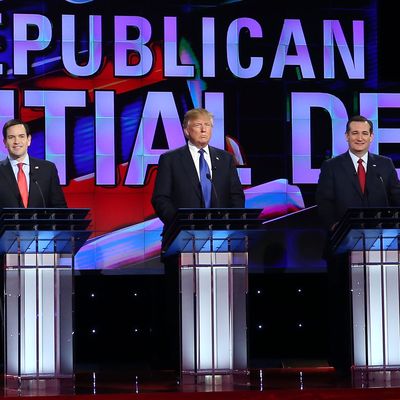
Marco Rubio and Ted Cruz followed nearly identical plans in Thursday night’s Republican presidential debate. They cast themselves as the true conservatives in the debate and attacked Donald Trump as an ideological heretic. They almost completely abstained from attacks against each other, recognizing that Trump is on the verge of breaking away from the pack. And they picked apart his business record for its use of undocumented-immigrant labor and crookedness. Flanking Trump, the two shrewd, ambitious Cuban-American, first-term senators attempted to bring the front-runner down to Earth. If they failed to expose Trump in past debates — and judged by votes, if not by debating points, they have — it is hard to believe they succeeded this time.
The most effective hits against Trump came on his business record (ironically, one of the only subjects in the debate where Trump possesses some actual knowledge). He appeared uncomfortable and offered weak defenses. Why did he hire undocumented immigrants in his Miami hotel? Because it’s hard to find good help. Did he employ undocumented workers in Poland? That was a long time ago, Trump “explained.” At one point, Trump complained about being the subject of so many attacks, a clear sign of distress.
On the other hand, Rubio has built high favorability ratings while consistently refusing to attack fellow Republicans — indeed, by praising them as all superior to the Democrats. It remains to be seen if his high favorability can survive his new role as attack dog. In the meantime, he drew blood on Trump more effectively than any other antagonists have to date.
But toward the end of the debate, Trump recaptured his footing. During one exchange, Trump mentioned that he had donated money to Cruz. Rubio piped in that Trump had not given him anything, and Trump replied that Rubio had sent him a book with a message telling him he was doing a great job. Then he dismissed Rubio as a choke artist and Cruz as a liar. It was the Trump persona in its essence — the overbearing alpha-male character he honed as a reality-television star. Set in the middle of his two antagonists, and towering over them, he managed to restore them to their place as supplicants — politicians, mere talkers.
The ideological contrast was more fascinating. Unlike most primary debates, where candidates race to outflank each other, Trump and Rubio/Cruz allowed each other to hold the ground they wanted to defend. Rubio used both his opening and closing statements to position himself as the philosophically pure champion of the “conservative movement.” Rubio, like Cruz, assailed Trump as a moderate, and Trump seemed happy to accept the label. He presented himself as the pragmatic pro-Israel candidate, the one who would try to make a peace deal, while Rubio and Cruz insisted the Palestinians could never be dealt with. Trump even depicted Ronald Reagan as only somewhat conservative. In one extended exchange, he repeatedly promised not to allow Americans to die from lack of health insurance, a promise Rubio and Cruz attacked as heresy. Trump’s position reflected the message that has allowed him to dominate the most moderate segments of the Republican electorate.
In Trump’s closing statement, he promised to “get it done.” It was a reiteration of the vacuous populist promise that has sustained his popularity. Cruz and Rubio are betting that they can defeat Trump by prying him apart from conservative dogma, convincing Republicans he cannot be trusted to hold the party line. They are probably right about that. But the evidence to date suggests Trump’s voters just don’t care.






























